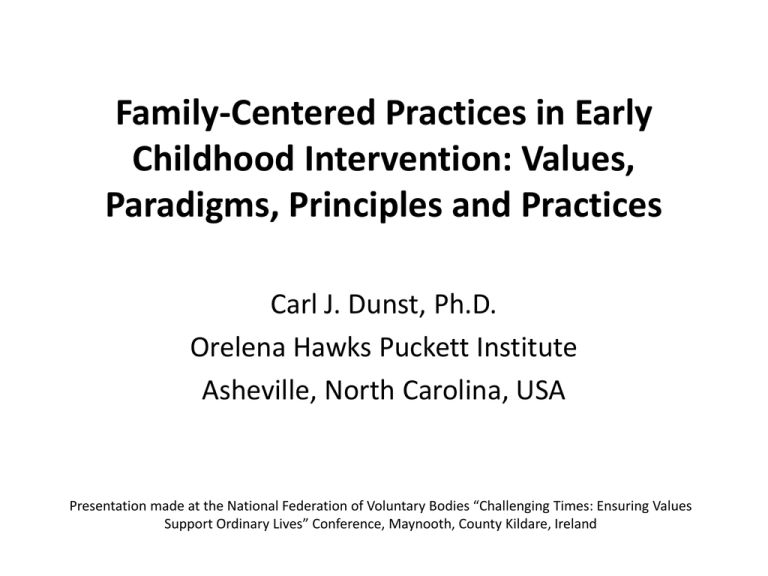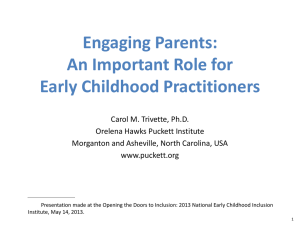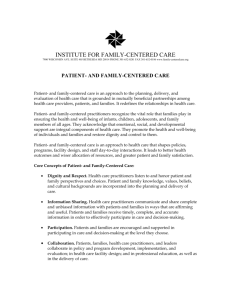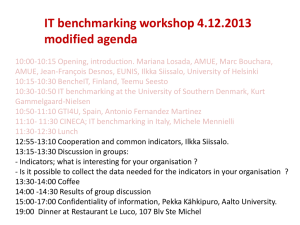Family-Centered Practices in Early Childhood Intervention
advertisement

Family-Centered Practices in Early Childhood Intervention: Values, Paradigms, Principles and Practices Carl J. Dunst, Ph.D. Orelena Hawks Puckett Institute Asheville, North Carolina, USA Presentation made at the National Federation of Voluntary Bodies “Challenging Times: Ensuring Values Support Ordinary Lives” Conference, Maynooth, County Kildare, Ireland Purpose of the Presentation • Describe the role of values in early childhood intervention and how family-centered beliefs can be used as the foundation for parent, family, and child capacity-building intervention practices • Describe the process one early childhood intervention program used to translate value statements into day-to-day practices for intervening with the parents of young children with disabilities and developmental delays Place of Values in Programs Serving Young Children with Disabilities and Their Families Values are belief statements regarding how persons involved in education, human services, and other kinds of intervention programs ought to be treated by help giving professionals •Paul Dokecki (1983) was one of the first professionals to propose a value framework for developing policies and practices for strengthening families •Advocates at the Center on Human Policy (1986) at Syracuse University (USA) first articulated “A Statement in Support of Families and Their Children” that included family strengthening practices Dokecki, P.R. (1983). The place of values in the world of psychology and public policy. Peabody Journal of Education, 60(3), 108-125. Center on Human Policy. (1986). A statement in support of families and their children. Syracuse, NY: Division of Special Education and Rehabilitation, School of Education, Syracuse University. The Process of Translating Values in to Practices The process of translating value statements into familycentered practices was facilitated by “working through” the beliefs, assumptions, attitudes, and personal frames-of-mind of practitioners using benchmarks and standards for assessing the match between values and practices Value Statements Capacity-Building Paradigm Family Support Principles Family-Centered Practices Family, Infant, and Preschool Program Morganton, North Carolina, USA An early childhood intervention and family support program serving young children with and without disabilities and delays that adopted, applied, revised, and evaluated the use of family-centered principles and practices for implementing or providing different kinds of child, parent, parentchild, and family-level interventions, supports, and resources. Value Statements FIPP used value statements articulated by both the Center on Human Policy (Syracuse, NY) and the Family Resource Coalition (Chicago, IL) as well as the value statements described in Strengthening Families (Nicolas Hobbs et al.) and In Praise of Paradox (Julian Rappaport) to formulate a set of value statements that emphasized a strengths-based approach to intervention. Some examples of these value statements are: Every family member has existing strengths and the capacity to become more competent and there are no exceptions •Every family deserves to be treated with dignity and respect at all times •Families have the rightful role to decide what is in the best interest of their members Hobbs, N., Dokecki, P.R., Hoover-Dempsey, K.V., Moroney, R.M., Shayne, M.W., & Weeks, K.H. (1984). Strengthening families. San Francisco: Jossey-Bass. Rappaport, J. (1981). In praise of paradox: A social policy of empowerment over prevention. American Journal of Community Psychology, 9, 1-25. Paradigms Paradigms are worldviews or models for describing the key features and elements of how one thinks about, organizes, and uses the different features and elements of a model for conceptualizing and implementing intervention practices. • The traditional paradigm in education, human services, and health care has been a deficit-based approach to intervention • An alternative paradigm more aligned with strengthsbased values is a capacity-building approach for conceptualizing and implementing intervention practices Family Support Principles Family support principles are belief statements about how supports and resources ought to be made available to parents and other family members involved in early childhood intervention, parenting support, and family resource programs which specify how staff should interact with and treat families Family, Infant and Preschool Program Principles and Guiding Beliefs 1984 1986 1994 1999 Promotional Empowerment Through Partnerships Family Support Principles (Based primarily on A Statement in Support of Families and Their Children) Family Support Principles (Revision of the 1986 principles) Family, Infant and Preschool Program Guiding Principles (Evidence-based principles) Family, Infant and Preschool Program Guiding Principles • • Families and family members are treated with dignity and respect at all times. • Family choice and decision-making occur at all levels of participation in the program. • Information necessary for families to make informed choices is shared in a sensitive, complete, and unbiased manner. • • Practices are based on family-identified desires, priorities, and preferences. • A broad range of informal, community and formal supports and resources are used for achieving family-identified outcomes. • Staff build on child, parent and family strengths, assets, and interests as the primary way of strengthening family functioning. • Staff-family relationships are characterized by partnerships and collaboration based on mutual trust, respect, and problem solving. • Staff use help giving practices that support and strengthen family functioning. Staff are sensitive, knowledgeable, and responsive to family, cultural, ethnic, and socio-economic diversity. Staff provide supports, resources, and services to families in a flexible, responsive and individualized manner. Family-Centered Practices Research has consistently found that there are two clearly discernable subsets of familycentered principles that “fall into” distinct categories of practice: • Relational Practices • Participatory Practices Relational Practices Relational practices include behaviors typically associated with effective helpgiving (active listening, compassion, empathy, etc.) and positive staff attributions about program participant capabilities. These kinds of practices are typically described in terms of behaviors that strengthen program participant/staff interpersonal relationships (mutual trust, collaboration, etc.). Participatory Practices Participatory practices include behaviors that involve program participant choice and decision making, and which meaningfully involve participants in actively procuring or obtaining desired resources or supports or achieving desired life goals. These kinds of practices strengthen existing competencies and provide opportunities for learning new capabilities. Examples of Family-Centered Practice Indicators Relational Indicators • Staff really listen to my concerns and requests • Staff see me and my family in a positive, healthy way • Staff are sensitive to my family’s beliefs and customs • Staff recognize the good things I do as a parent Participatory Indicators • Staff provide me information I need to make good choices • Staff support me when I make a decision • Staff help me be an active part of getting desired resources and supports • Staff are flexible when my family’s situation changes Measuring Adherence to Family Support Principles and Practices • • • Adherence to family-centered principles and practices is measured in terms of program participant judgments of the extent to which program staff interact with and treat participants and their family members in ways consistent with the intent of family support principles We considered the Family, Infant and Preschool Program guiding principles a behavioral promise and program guarantee that staff would treat families in ways consistent with the intent of the principles A consumer sciences perspective was used to assess staff adherence to family support principles and practices where consumers (parents) were considered the primary source of evidence that program staff interacted and treated familiar in ways consistent with the program principles Measuring Adherence to Family Support Principles • In a typical adherence study or survey, program participants were asked to indicate on a 5-point scale ranging from never to always the extent to which staff treat or interact with the respondent and his or her family in the ways indicated • A typical survey includes 5 or 6 relational indicators and 5 or 6 participatory indicators • Percentage of indicators receiving the highest rating on a 5-point scale indicating that a respondent and his or her family are always treated in the way consistent with the scale indicators Sources of Information for Assessing Adherence to Family-Centred Practices • Eighteen (18) studies conducted between 1990 and 2004 at the Family, Infant and Preschool Program (Morganton, NC, USA) • One thousand ninety six (1096) program participants • Thirteen thousand five hundred and eleven (13,511) indicators a Dunst, C.J., & Trivette, C.M. (2005). Measuring and evaluating family support program quality. Winterberry Press Monograph Series. Asheville, NC: Winterberry Press. Degree of Adherence to Family-Centred Practices 100 PERCENT OF INDICATORS 90 Relational Indicators Participatory Indicators 80 70 60 50 40 30 20 '90 '92 '93 '94 '95 '96 '97 '98 '99 '00 '01 '02 '03 '04 YEAR Figure 4. Promoting Practitioner Adoption and Use of Family-Centered Practices Family-centred checklists can be used as standards against which program or practitioner practices can be assessed as consistent with the intent of familycentred practices Relational Practices Indicators Participating Practices Indicators Conclusions and Implications for Practice • Translating values into day-to-day practices that are used with children and their families takes time and thoughtful activity. • Becoming a family-centered program is a lot easier than remaining a family-centered program. Many different things can and will get in the way. • Constant vigilance to how staff interact and treat families is necessary to stay-on-top-of-things. Seek parent input and feedback on a regular basis. • Always remain aware of and focused on the fact that family-centered practices are how other kinds of interventions are implemented.











